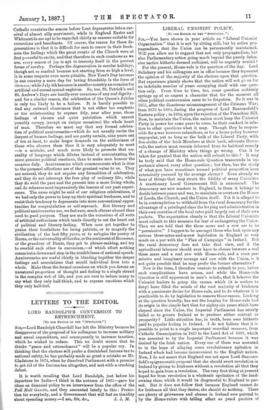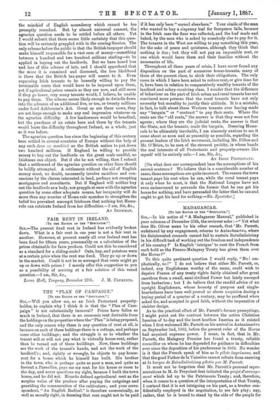LIBERAL UNIONIST POLICY.
To TEE EDITOR OP TEE " SPECTATOR. " I
Sia,—You have shown in your article on "Liberal Unionist Organisation" that it is not by sitting still, but by active pro- pagandism, that the Union can be permanently maintained. Will you allow me to suggest that not only propagandism, but also Parliamentary action going much beyond the purely defen- sive tactics hitherto deemed sufficient, will be urgently needed ?
For the present, Home-rule is the question of the day. Lord Salisbury and his colleagues are in office because they represent the opinion of the majority of the electors upon that question. But experience plainly shows that the nation will not go on for an indefinite number of years oconpying itself with one ques- tion only. From time to time, too, some question suddenly springs up of so urgent a character that for the moment all other political controversies seem to be forgotten. So it was in 1855, after the disastrous mismanagement of the Crimean War; from 1876 to 1880, during the progress of Lord Beaconsfield's Eastern policy ; in 1884, upon the rejection of the Franchise Bill. Now, to maintain the Union, the nation must keep the Unionist Party in power for some years to come, be their conduct in rela- tion to other questions what it may. Though they be respon- sible for a war however calamitous, or for a home policy however unpopular, yet as long as the bulk of the Liberal Party, with five-sixths of the Irish Members at their back, advocate Home- rule, the nation must remain debarred from its habitual remedy of a change of Ministry when things go wrong. Can it be taken for granted that the nation will submit to this ? It may be truly said that the Home-rule Question transcends in im- portance almost every other question ; but then, has the study of what you have sometimes termed political proportion been extensively pursued by the average elector P Even already we hear of things that may strain the fidelity of many Unionists. A reactionary Local Government Bill is announced. The democracy are now masters in England, to them it belongs to decide between peace and war, to maintain or overturn the House of Lords, the Church, and the Union itself. Yet it is alleged to be in contemplation to withhold from the rural democracy for the advantage of a privileged class the levying and administration in their own counties of the local rates paid largely out of their own pockets. The expectation clearly is that the Liberal Unionists must submit to this measure for fear of endangering the Union. Then we are told that the three acres and a cow are to be " permissive." I happen to be amongst those who look upon any serious three-acres-and-a-cow legislation in England as very much on a par with the "Plan of Campaign" in Ireland. But the rural democracy does not take that view, and if the agricultural labourer should ever have to choose between a real three acres and a real cow with Home-rule, and a mere per- missive and imaginary acreage and cow with the Union, is it not quite possible that he may prefer the former alternative P Now is the time, I therefore venture to submit to you, before such complications have arisen, and while the Home-rule Question is still uppermost in men's minds, that it behoves the Unionist leaders to grasp the causes which (it is useless to deny) have filled the minds of the vast majority of Irishmen with a passionate desire for Home-rule, and to do whatever it is practicable to do by legislation to remove those causes. Looking at the question broadly, has not the longing for Home-rule had its origin in the simple fact that for eighty-six years which have elapsed since the Union, the Imperial Parliament has utterly failed so to govern Ireland as to produce either content or prosperity P Little attention has, in truth, been ever hitherto paid to popular feeling in Ireland. I do not believe that it is possible to point to a single important remedial measure, from Catholic Emancipation in 1829 to the Land Act of 1881, which was assented to by the Imperial Parliament because it was desired by the Irish nation. Every one of them was assented to in the hope of allaying some revolutionary agitation in Ireland which had become inconvenient to the English nation. Now, I do not assert that England can act upon Lord Beacons- field's epigrammatic proposal that she should avert revolution in Ireland by giving to Irishmen without a revolution all that they hoped to gain from a revolution. The very first thing at present hoped for from revolution is a wholesale spoliation of the land. owning class, which it would be disgraceful to England to per- mit. Bat it does not follow that because England cannot do for Irishmen all that they desire, she should do nothing. There are plenty of grievances and abuses in Ireland now pointed to by the Home-rulers with telling effect as proof positive of the mischief of English ascendency which cannot be too promptly remedied. But by almost universal consent, the agrarian question needs to be settled before all others. Yet I would submit that there seems little certainty that this ques- tion will be seriously grappled with in the coming Session. The only scheme before the public is that the British taxpayer should make himself responsible for a vast sum of money—something between a hundred and two hundred millions sterling—to be applied in buying out the landlords. But we have heard less and less of this scheme of late, and I should apprehend that the more it is examined and discussed, the less likelihood is there that the British tax-payer will assent to it. Even supposing Irish tenants to be honestly willing to pay the terminable rents that would have to be imposed upon them, yet if agricultural prices remain as they are now, and still more if they go lower, very many tenants would, I believe, be unable to pay them. The scheme seems likely enough to dwindle down into the advance of an additional five, or ten, or twenty millions under Lord Ashbourne's Act. Great as are these sums, they are not large enough to make any real impression whatever on the agrarian difficulty. A few landowners would be benefited, but the purchase of an estate here and there by the tenants would leave the difficulty throughout Ireland, as a whole, just as it was before.
The agrarian question has since the beginning of this century been settled in several countries of Europe without the help of any such dens ex machine& as the British nation to put down two hundred millions. If England be willing to provide money to buy out the landlords on the great scale needful, no Irishman can object. But if she be not willing, then I submit that a settlement of the agrarian question on other lines should be boldly attempted. A settlement without the aid of English money must, no doubt, necessarily involve sacrifices and con- cessions by the classes interested in land, perhaps not excepting mortgagees and annuitants. But if England will neither buy out the landlords as a body, nor grapple at once with the agrarian question by some other adequate means, her incapacity will do more than any number of Home-rule speeches to strengthen the belief too prevalent amongst Irishmen that nothing but Home- rale can extricate Ireland from her difficulties.—I am, Sir, dm.,
AN IRISHMAN.















































 Previous page
Previous page